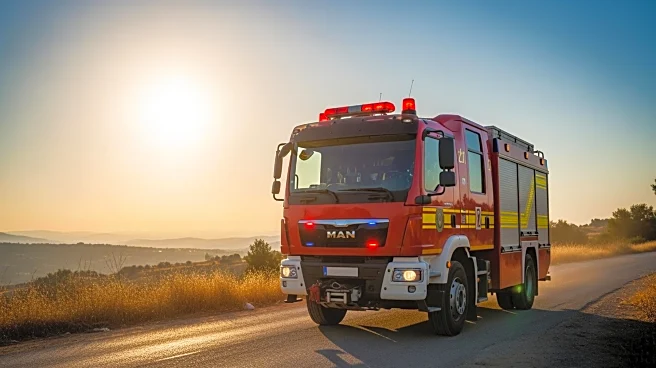What's Happening?
A significant fire has erupted near Yarka in the Western Galilee, prompting a large-scale response from Fire and Rescue Services. According to reports, 15 firefighting teams have been deployed to the area, along with an aerial firefighting unit, to manage
and extinguish the blaze. The fire's spread has raised concerns about potential damage to nearby communities and natural landscapes. The firefighting teams are working diligently to contain the fire and prevent further escalation. The cause of the fire has not been disclosed, and efforts are focused on controlling the flames and minimizing impact.
Why It's Important?
The fire near Yarka poses a threat to both residential areas and the environment in the Western Galilee. The deployment of multiple firefighting teams and aerial support underscores the severity of the situation. Fires in such regions can lead to significant ecological damage, affecting local wildlife and vegetation. Additionally, the proximity to populated areas raises concerns for public safety and property damage. The response by Fire and Rescue Services is crucial in mitigating these risks and ensuring the safety of residents. The incident highlights the importance of preparedness and rapid response in managing natural disasters.
What's Next?
Firefighting efforts are ongoing, with teams working to fully extinguish the fire and assess the damage. Authorities may investigate the cause of the fire to prevent future occurrences. Local communities are advised to stay alert and follow safety instructions from emergency services. The situation may prompt discussions on improving fire prevention strategies and resource allocation for emergency response in the region. Continued monitoring and support from firefighting units will be essential in managing the aftermath and recovery process.
Beyond the Headlines
The fire near Yarka may have broader implications for environmental policy and disaster management strategies in the region. It could lead to increased focus on fire prevention measures and the allocation of resources for emergency response. The incident may also spark discussions on climate change and its role in exacerbating fire risks. Long-term strategies may be considered to enhance resilience against such natural disasters, including community education and infrastructure improvements.

















